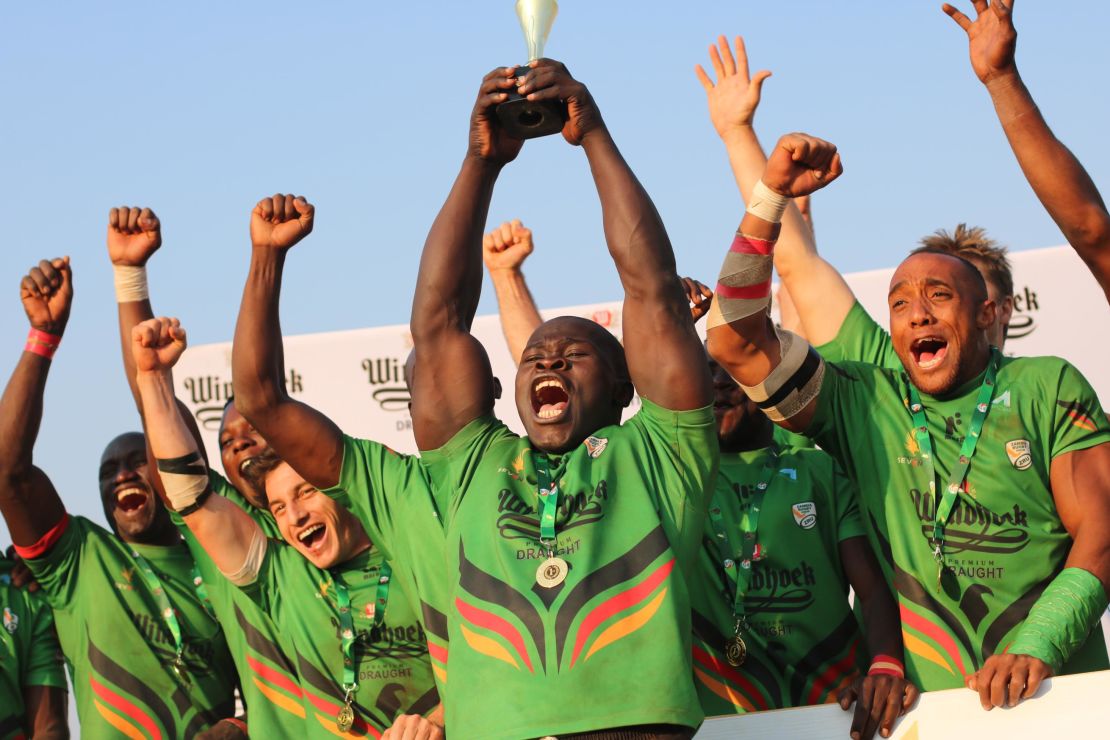Story highlights
Zambia sevens go to Commonwealth Games
First time ever for emerging rugby nation
Drawn in a group with New Zealand
Zambia’s rugby players are about to enter uncharted territory.
The destination is Australia’s Gold Coast; the reason for their journey is the Commonwealth Games. This is, by some distance, the biggest stage the country’s sevens team has played on.
If that doesn’t sound daunting enough, there’s another caveat. Zambia has been drawn in a pool with Canada, Kenya, and – wait for it – New Zealand.
The All Blacks, as well as being the world’s most famous rugby-playing nation, are four-time Commonwealth champions. A terrifying prospect on the one hand.
But on the other, it presents Zambia’s semi-professional players with massive opportunities to achieve recognition on a global scale and for the sport to gain popularity back home.
The atmosphere within the team, needless to say, is buoyant.
“It will be a once in a lifetime opportunity,” vice-captain Guy Lipschitz tells CNN Sport. “I’m really excited to play against the game’s biggest, top-tier sides. Zambia has obviously come quite a long way in terms of playing second-tier teams.
“Zambia has progressed a lot in a year, year and a half … In terms of the popularity of the sport, I think it will be huge, having that exposure for the sevens.”

READ: Jamaica’s Crocs forging ‘Cool Runnings on grass’ tale
READ: Australian rugby taking ‘enormous steps’ into the future
‘A very big milestone’
Like many of Zambia’s sevens players, Lipschitz is an amateur juggling his rugby commitments alongside a full-time job. Others are still in college and university, training three times a week with clubs and playing league games at the weekend.
Qualification for the Commonwealths came courtesy of a fourth-place finish in the 2017 Africa Sevens Cup which saw Zambia notch victories over Morocco, Tunisia, Ghana and Senegal.
Despite losing the third-place playoff to Magadascar, Zambia finished as the second-ranked Commonwealth nation behind tournament champion Uganda.
The team has two tournaments before it arrives on the Gold Coast – the Royal Bafokeng Sevens in Sun City, South Africa, followed by the Victoria Falls Sevens in Zimbabwe. Two new coaches have also been recruited – Nyundo Artmitage, a former captain of Zambia sevens, and Neill Nortje, who brings experience of coaching South African side the Golden Lions.
“It’s a very big milestone for us to be able to play in the Commonwealths,” Clement Sinkamba, president of the Zambian Rugby Union, tells CNN Sport. “This opens up our country as an emerging rugby-playing nation.
“We are also hoping that by playing such big names as the All Blacks, that should really give us impetus to move forward … That our players will start breaking into professional ranks and some teams will spot talent in our players and pick some of them for professional careers.”

Growing the game
Zambia isn’t necessarily a stranger to international competition. Last year brought victory over Zimbabwe in the final of the Zambia Rugby Sevens International. The team also featured in the Dubai Rugby Sevens Invitational, which runs alongside the main leg of the Sevens World Series.
In the past, the team has played the likes of Canada and Italy, and once upon a time came within a point of overturning Australia, eventually going down 11-12.
Having qualified for the Commonwealths, Sinkamba says that he wants to see Zambia crowned African champions and to be given a berth in the Sevens World Series alongside Kenya, Uganda and Zimbabwe.
Developing Zambian rugby at an elite level is one thing; there are also ambitions that the grassroots can grow. The fast-paced, seven-a-side format of the game could be key in this regard.
“Fifteen-a-side is physically quite tough,” explains Lipschitz. “In Zambia, we are not physically as big as other teams – we can’t dominate that aspect of the game.
“In sevens you can just hold your own in the physical department and make up for the difference with speed. That’s where Zambia will excel quite quickly.”

READ: Fiji overturns South Africa in Hamilton Sevens final
READ: Can Fiji’s hero change France’s fortunes?
Across Africa, rugby participation is increasing. In 2017, rugby was taught in 22,000 schools, a 4,000 increase on the previous year. There were six African countries playing rugby regularly in 2002, but today there are 38 (out of 105.)
Zambia has 10,200 registered players – 1,600 men, 200 women, and 8,400 youths – and has 16 clubs across the country, twice as many as in 1996. There are, however, issues that still need to be tackled.
“Equipment – that’s where we have the biggest problem,” says Sinkamba. “We will appeal to World Rugby to try and assist us with more balls and equipment so that our lower structures are developed and that we are playing rugby at grassroots: primary schools, secondary schools, high schools.
“We have a number of schools playing rugby, but when it comes to sourcing kit that becomes a very big problem.”
Visit cnn.com/rugby for more news and videos
There are, however, rugby pitches in every town, and football fields in schools are being adapted for rugby. Zambia just needs players to keep filling those pitches and enough balls to pass around them.
After all, who wouldn’t want to get out on a rugby pitch after seeing their country score a try against New Zealand?



















